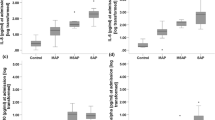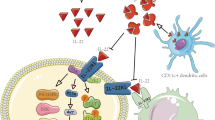Abstract
Acute pancreatitis is increasing in incidence but overall mortality has remained steady in the past decade at approximately 8%.1 Death from acute pancreatitis is usually the result of multiple organ dysfunction syndrome (MODS). Like other acute inflammatory conditions, MODS in acute pancreatitis is associated with the release of cytokines, chemokines and other inflammatory mediators.2–5 Increased expression of a wide variety of mediators has been reported in patients with severe acute pancreatitis although the association between the dynamics of the cytokine response and the development of MODS or death is less clear.2 It seems that the persistence of an inflammatory response is the important factor in the pathophysiology of MODS. In a recent study of 121 patients with predicted severe acute pancreatitis,6 more than 60% of cases met the criteria for the systemic inflammatory response syndrome (SIRS). Forty-four of these patients developed MODS and this was strongly associated with persistence of SIRS for more than 48 h. Mortality overall was 11% and was confined to the small subgroup of patients with deteriorating MODS. Previous studies, based on the original Atlanta criteria,7 have grouped all patients with MODS as having ‘severe’ pancreatitis (including patients with both transient and persisting MODS) and compared these with the larger group of patients with uncomplicated attacks. These recent clinical data suggest that it is only the small subgroup of patients with deteriorating MODS in whom the inflammatory response should be considered pathological. In the remainder of patients, homeostasis is rapidly restored.6
Access this chapter
Tax calculation will be finalised at checkout
Purchases are for personal use only
Preview
Unable to display preview. Download preview PDF.
Similar content being viewed by others
References
McKay CJ, Evans S, Sinclair M, et al. High early mortality rate from acute pancreatitis in Scotland, 1984–1995. Br J Surg 1999; 86 (10):1302–5.
Brivet FG, Emilie D, Galanaud P. Pro- and anti-inflammatory cytokines during acute severe pancreatitis: an early and sustained response, although unpredictable of death. Parisian Study Group on Acute Pancreatitis. Crit Care Med 1999; 27 (4):749–55.
Hirota M, Nozawa F, Okabe A, et al. Relationship between plasma cytokine concentration and multiple organ failure in patients with acute pancreatitis. Pancreas 2000; 21 (2):141–6.
McKay CJ, Gallagher G, Brooks B, et al. Increased monocyte cytokine production in association with systemic complications in acute pancreatitis. Br J Surg 1996; 83 (7):919–23.
Norman J. The role of cytokines in the pathogenesis of acute pancreatitis. Amer J of Surg 1998; 175 (1):76–83.
Buter A, Imrie CW, Carter CR, et al. Dynamic nature of early organ dysfunction determines outcome in acute pancreatitis. Br J Surg 2002; 89 (3):298–302.
Bradley EL. A clinically based classification system for acute pancreatitis. Summary of the International Symposium on Acute Pancreatitis, Atlanta, Ga, September 11 through 13, 1992. Arch of Surg 1993; 128 (5):586–90.
Bidwell J, Keen L, Gallagher G, et al. Cytokine gene polymorphism in human disease: on-line databases. Genes & Immunity 1999; 1 (1):3–19.
Molvig J, Baek L, Christensen P, et al. Endotoxin-stimulated human monocyte secretion of interleukin 1, tumour necrosis factor alpha, and prostaglandin E2 shows stable interindividual differences. Scand J of Immun 1988; 27 (6):705–16.
Eskdale J, Gallagher G, Verweij CL, et al. Interleukin 10 secretion in relation to human IL-10 locus haplotypes. Proc National Acad Sci USA 1998; 95 (16):9465–70.
Westendorp RG, Langermans JA, Huizinga TW, et al. Genetic influence on cytokine production and fatal meningococcal disease. Lancet 1997; 349 (9046):170–3.
Jacob CO, Fronek Z, Lewis GD, et al. Heritable major histocompatibility complex class II-associated differences in production of tumor necrosis factor alpha: relevance to genetic predisposition to systemic lupus erythematosus. Proc National Acad Sci 1990; 87 (3):1233–7.
Nedospasov SA, Udalova IA, Kuprash DV, et al. DNA sequence polymorphism at the human tumor necrosis factor (TNF) locus. Numerous TNF/lymphotoxin alleles tagged by two closely linked microsatellites in the upstream region of the lymphotoxin (TNF-beta) gene. J of Immun 1991; 147 (3):1053–9.
Pociot F, Molvig J, Wogensen L, et al. A tumour necrosis factor beta gene polymorphism in relation to monokine secretion and insulin-dependent diabetes mellitus. Scand J of Immun 1991; 33 (1):37–49.
Wilson AG, Symons JA, McDowell TL, et al. Effects of a polymorphism in the human tumor necrosis factor alpha promoter on transcriptional activation. Proc National Acad Sci 1997; 94 (7):3195–9.
Stuber F, Petersen M, Bokelmann F, et al. A genomic polymorphism within the tumor necrosis factor locus influences plasma tumor necrosis factor-alpha concentrations and outcome of patients with severe sepsis. Crit Care Med 1996; 24 (3):381–4.
Majetschak M, Flohe S, Obertacke U, et al. Relation of a TNF gene polymorphism to severe sepsis in trauma patients. Ann of Surg 1999; 230 (2):207–14.
Mira JP, Cariou A, Grall F, et al. Association of TNF2, a TNF-alpha promoter polymorphism, with septic shock susceptibility and mortality: a multicenter study. JAMA 1999; 282 (6):561–8.
Tang GJ, Huang SL, Yien HW, et al. Tumor necrosis factor gene polymorphism and septic shock in surgical infection. Crit Care Med 2000; 28 (8):2733–6.
Stuber F, Udalova IA, Book M, et al. 308 tumor necrosis factor (TNF) polymorphism is not associated with survival in severe sepsis and is unrelated to lipopolysaccharide inducibility of the human TNF promoter. J of Inflammation 1995; 46 (1):42–50.
Powell JJ, Fearon KC, Siriwardena AK, et al. Evidence against a role for polymorphisms at tumor necrosis factor, interleukin-1 and interleukin-1 receptor antagonist gene loci in the regulation of disease severity in acute pancreatitis. Surgery 2001; 129 (5):633–40.
Sargen K, Demaine AG, Kingsnorth AN. Cytokine gene polymorphisms in acute pancreatitis. JOP: Journal of the Pancreas 2000; 1 (2):24–35.
Turner DM, Williams DM, Sankaran D, et al. An investigation of polymorphism in the interleukin10 gene promoter. Eur J of Immun 1997; 24 (1):1–8.
Ma P, Chen D, Pan J, et al. Genomic polymorphism within interleukin-1 family cytokines influences the outcome of septic patients. Crit Care Med 2002; 30 (5):1046–50.
Smithies AM, Sargen K, Demaine AG, et al. Investigation of the interleukin 1 gene cluster and its association with acute pancreatitis. Pancreas 2000: 20 (3):234–40.
Arnalich F, Lopez-Maderuelo D, Codoceo R, et al. Interleukin-1 receptor antagonist gene polymorphism and mortality in patients with severe sepsis. Clin & Exp Immun 2002; 127 (2):331–6.
Rights and permissions
Copyright information
© 2004 Springer-Verlag London
About this chapter
Cite this chapter
McKay, C.J., Buter, A. (2004). Cytokine Gene Polymorphisms in Acute Pancreatitis. In: Pancreatic Disease. Springer, London. https://doi.org/10.1007/978-1-85233-904-3_24
Download citation
DOI: https://doi.org/10.1007/978-1-85233-904-3_24
Publisher Name: Springer, London
Print ISBN: 978-1-4471-3491-6
Online ISBN: 978-1-85233-904-3
eBook Packages: Springer Book Archive




